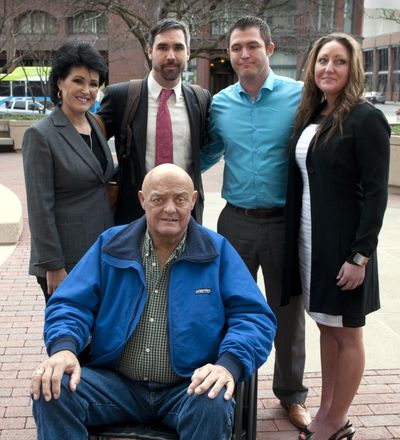At Kettle Falls Five trial, man says he smoked most of 30 pounds of pot he earned

The 39-year-old Seattle resident who was once part of the shrinking group of defendants in a federal trial targeting a marijuana grow near Colville said Friday he took an eleventh-hour plea deal to come clean about his involvement.
“My understanding is I was required to come in and tell the truth, as best as I know it,” said Jason Zucker, an original member of the “Kettle Falls Five” group of Stevens County residents who say they were growing pot for their medical needs.
Zucker testified in court Friday, the third day of an ongoing trial in Spokane in which the remaining three members of the group face drug manufacturing, distribution, conspiracy and weapons charges. His plea deal with prosecutors calls for 16 months in prison in exchange for his testimony.
Zucker had faced a potential 20-year prison sentence if convicted by the jury. He already has three drug convictions and said Friday he’d also overseen an illicit marijuana operation in California and rented property near Prescott, Washington, to a marijuana business.
Zucker’s testimony provided details of how the marijuana grow began on property owned by Larry Harvey in the early months of 2011. Zucker said he was approached by Harvey’s son, Rolland Gregg, in Seattle to set up a grow on the 33-acre parcel about 9 miles north of Colville. Gregg’s wife, Michelle, and his mother, Rhonda Lee Firestack-Harvey, also participated in the operation, and the five evenly split their crop at the end of the year, Zucker testified.
Larry Harvey has been dismissed from the case after being diagnosed with terminal pancreatic cancer in December. The remaining members of the family dispute the charges against them, saying they were growing marijuana for personal medical use under practices protected by Washington law, and that firearms found on the property were used primarily for hunting. But jurors aren’t allowed to hear those details.
Zucker told jurors he didn’t know what the other members of the family did with their portion of the marijuana grown near Colville in 2011. He said he took his roughly 30 pounds back to Seattle, where he smoked most of it himself and gave the rest to friends and family members. Zucker said he’d smoked weed since he was 17, and burned through roughly an eighth of an ounce per day before quitting two years ago after his indictment. Police found 8 pounds of marijuana remaining from the Colville grow in his Seattle residence when they arrested Zucker in February 2013.
“I know a lot about growing plants, and I’m good at it,” said Zucker, when asked by Assistant U.S. Attorney Caitlin Baunsgard why he was initially approached to help the family set up an operation on their property.
Phil Telfeyan, a Washington, D.C., civil rights attorney hired by Rolland Gregg, pressed Zucker on his decision to testify against the family as part of a plea deal inked hours before the trial began Wednesday. He also asked Zucker if he had any evidence the family used the three weapons found on the property – a bolt-action hunting rifle, a 12-gauge shotgun and a Ruger 9mm pistol – to protect their marijuana, or if he knew they were distributing it to other people.
“I didn’t ask,” Zucker said. “It wasn’t related to my business.”
Zucker said he “reluctantly” chose to help the family again in 2012 after providing compost recipes and financing the operation at a personal cost of close to $10,000 the year before. State authorities searched the property in August 2012, and federal authorities followed suit a week later, prompting the controversial criminal case in Spokane. The outcome is widely anticipated by marijuana advocates both local and nationwide, who claim the federal government is overreaching its authority by pursuing a case against a nonviolent, rural family grow.
U.S. Attorney Michael Ormsby sat in the courtroom for some of Zucker’s testimony. Baunsgard handled the questioning of Zucker, after Assistant U.S. Attorney Earl Hicks oversaw morning questioning of law enforcement personnel who searched the property.
Rolland Gregg was asked by U.S. District Court Judge Thomas Rice to remove a lapel pin, which appeared to be a green ribbon with a red cross, after Baunsgard said it was a medical marijuana symbol that could bias the jury. Gregg said it was a gift from his father, meant to honor his fight against cancer.
Telfeyan earned a rebuke from Rice when he attempted to question one of the law enforcement witnesses for the government about the difference between “black market” and legal marijuana prices in Washington state.
“I’ve already ruled,” Rice said, in front of the jury. “We’re not going to go there.”
Zucker said the family did not sign any sort of written agreement about their plans to grow, nor did they discuss their defense plans after the federal authorities raided the property.
“I don’t know,” he said. “I guess we trusted each other.”
The prosecution signaled it would conclude its case Monday, and Larry Harvey still is deciding whether to testify in defense of his family, attorneys said.
The trial is expected to conclude next week.